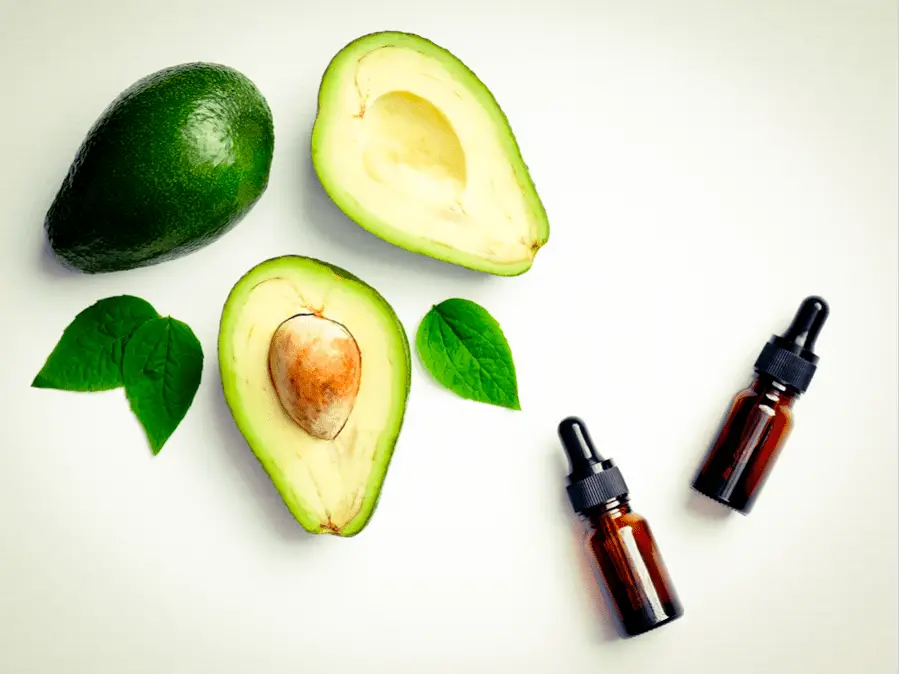Massage oil is an excellent ‘pick-me-up’ at the end of hectic days as it gets your body refreshed and recharged. But you may wonder, are massage oils good for your skin?
Massage oils can be good for your skin, since many of them help keep your skin hydrated, provide important vitamins that help with dermatitis, improve the cell regeneration process, and have anti-inflammatory and anti-bacterial qualities. Not all massage oils provide the same kind of nutrition or benefits, so it’s necessary to choose one that suits your goals.
It’s important to note that certain massage oils should be avoided if you are allergic to them or have other health conditions, such as acne.
Let’s dig deeper and find out some of the best natural massage oils that are good for your skin!
Avocado Oil

If you’re suffering from dry skin, avocado oil is a must-have body massage oil. In most cases, dry skin is an indication that you lack certain nutrients in your diet. This oil will not only eliminate the dryness but will also give your skin the required nutrients to keep you glowing.
Avocado oil contains vitamins A, C, D, and E and has been shown to have anti-inflammatory effects, making it an ally to address dry skin problems, such as wrinkles, cracks, and patchy texture.
Since the avocado oil is very thick, it should be blended with a carrier oil, such as almond oil or jojoba oil, to reduce its thickness and allow an easy application.
Sweet Almond Oil

This is one of the best natural body massage oil. It’s a darling for many massage therapists, perhaps due to its mild and sweet fragrance. It is pale yellow in color and is extracted from almonds.
The sweet almond oil is somewhat greasy, allowing it to glide graciously on your skin. Your skin can absorb it pretty fast, but not so fast that you will need another application a few minutes later. It doesn’t irritate your skin and can be used for all skin types.
The oil has anti-inflammatory qualities that help it relieve rashes and itching. This oil has traditionally been used to treat conditions such as psoriasis and eczema and has been shown to help with dermatitis.
Due to its vitamin E content and its natural sunscreen effect, it may also help prevent your skin from sun damage if you’re exposed to excessive sun’s UV rays.
Note: Make sure you think about nut allergies with this one. If you’re going to massage someone else, check with them before using a nut-based massage oil.
Olive Oil
You probably know olive oil as the miracle worker in your kitchen, but are you aware of its exceptional therapeutic properties when utilized in body massage? Apart from its moisturizing abilities, this oil comes with more radiance and nourishment for your skin.

If you’re planning to have a massage session, especially after an intense workout, you cannot go wrong with olive oil. This is because it helps to relax your skin and relieve any ache or irritation you may be experiencing. Also, it has anti-inflammatory properties that make it a good ally to heal inflamed tissues, easing any strain on your neck, shoulders, and back.
Typically, olive oil takes some time before it is fully absorbed into your skin. Therefore, it can be combined with other steam treatments to allow the skin to absorb the nutrients faster. Once it’s fully absorbed, you won’t remember what having dull and dry skin felt like. A true miracle worker this one!
Argan Oil
This massage oil works best if it’s used after a warm bath. It’s light and non-greasy and will instantly soften your skin.

Argan oil improves your skin’s elasticity, making it firm and helping address signs of aging, such as sagging or loose skin. It also enhances the hydration levels of your skin, keeping it moisturized at all times. At the same time, it improves your skin’s water-holding capacity, so you don’t have to suffer from dryness.
Overall, this massage oil is an excellent choice to improve the health of your skin and leave you glowing.
Sesame Oil
In Ayurveda (Indian traditional medicine), sesame oil is mainly used for detoxifying and nourishing effects. Thanks to its anti-bacterial and anti-inflammatory properties, this oil has grown in popularity and is now used worldwide as a massage oil for nourishing the skin and improving overall health. According to this tradition, sesame oil massage could help strengthen your entire body structure, including your muscles, ligaments, and tendons.

Due to its natural sunscreens, sesame oil helps with all forms of skin damage that may be caused by excess UV exposure. These include effects of skin tanning, wrinkles, fine lines, and sunspots. If left untreated, these marks of sun damage might impact the youthful look of your skin.
Sesame oil is thick and can leave your skin feeling oily. For best results, you can blend it with another lighter massage oil of your choice.
Jojoba Oil

There is a valid reason behind the high price tag on jojoba oil. When compared to other carrier massage oils, jojoba oil absorbs quickly, so you might need to reapply it a second time, especially if you are using it for long massages. But what makes it special? Well, that list is long: it’s neither prone to getting rancid quickly nor greasy, which means that you don’t have to worry about staining your sheets. If you find this last feature interesting, check out my article ‘Which Massage Oil Won’t Stain My Sheets?’
Jojoba oil is gentle on your skin and doesn’t cause irritation, it’s proven to be helpful in treating acne, and it’s an amazing career oil that has no odor to it. What’s more, it has a long shelf life and anti-bacterial properties that are beneficial for your overall skin health.
What to Consider Before Settling on a Specific Massage Oil

- The aroma: A massage oil with a strong odor may leave you feeling uneasy and gasping for fresh air. Therefore, consider an oil that has a light and pleasing fragrance.
- Purity: Avoid massage oils that contain preservatives and additives as most of their benefits are diluted.
- Viscosity: Avoid those oils with a sticky or greasy feel. A good massage oil should have a smooth glide on your skin.
- Possible allergies: Be sure to avoid any massage oils, essential oils, or carrier oils if you are allergic to them or any of the components in the products. If you experience problems such as breathing issues, changes in consciousness, headache, or dizziness, seek medical treatment immediately.
- Other health conditions: A patch test with oil is always a good idea before using massage oil to assess if your skin can tolerate it. If you have acne, bear in mind that some massage oils can actually clog pores (they are ‘comedogenic’). Looks for massage oils that are ‘non-comedogenic.’ Depending on where you live, this information could be labeled in black and white on beauty products.
Now you have a clear picture of the benefits of massage oils for your skin and how to choose the massage oil that best suits your goals and preferences. Enjoy!
If your would like to know how to care for your massage oils and be able to take advantage of the amazing benefits they can provide for your skin for longer, make sure to check out my article ‘Can Massage Oils Expire? How Long Do They Last and How to Store Them.’


